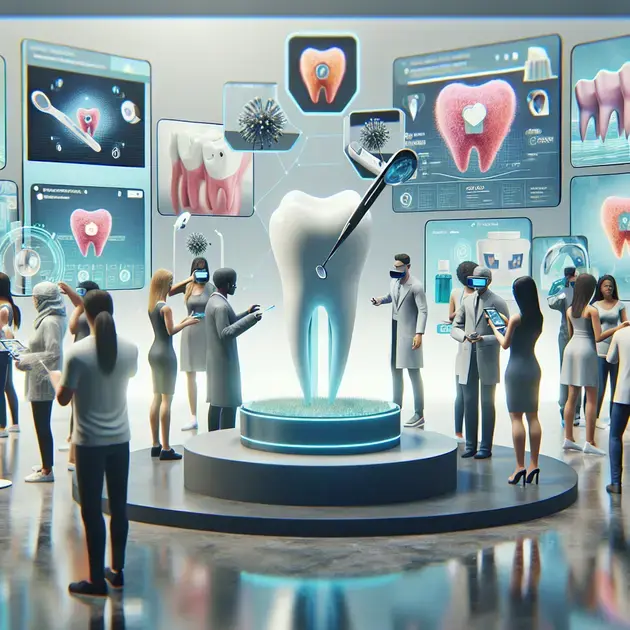Decaying smiles are a serious issue that affects many individuals around the world. The shocking truth about rotting teeth is not only limited to poor oral hygiene but can also be a sign of underlying health conditions.
Recent studies have shown a direct link between decaying teeth and an increased risk of cardiovascular diseases. This alarming revelation reinforces the importance of proper dental care and regular check-ups to maintain overall health and well-being.

The Hidden Dangers of Neglected Dental Health
Neglecting dental health can lead to a myriad of negative consequences, both for oral hygiene and overall well-being. One of the most common dangers of neglected dental health is the development of cavities, which can escalate into more serious issues like gum disease and tooth loss if left untreated. To prevent these risks, it is crucial to prioritize regular dental check-ups and maintain a consistent oral hygiene routine.
A step-by-step approach to taking care of your dental health includes brushing your teeth at least twice a day with fluoride toothpaste, flossing daily to remove plaque and food particles, and using an antiseptic mouthwash to kill bacteria. Additionally, scheduling bi-annual dental check-ups and cleanings with a professional dentist is essential for early detection and treatment of any potential issues.
An excellent resource for finding informative tips on maintaining good dental health is the American Dental Association (ADA) website. The ADA offers a range of articles, videos, and tools to help individuals understand the importance of oral care and how to best protect their teeth and gums.
By staying proactive and informed about the hidden dangers associated with neglected dental health, individuals can take control of their oral well-being and avoid more serious complications down the road.
Unveiling the Connection Between Decaying Teeth and Cardiovascular Risk
Recent studies have revealed a surprising link between decaying teeth and an increased risk of cardiovascular problems, such as heart disease and stroke. The bacteria that thrive in the mouth due to poor dental hygiene can enter the bloodstream through inflamed gums and potentially contribute to the development of cardiovascular issues.
To uncover this connection and protect both your dental and heart health, it is essential to prioritize regular dental check-ups and cleanings, as well as adopt a heart-healthy lifestyle. This includes maintaining a balanced diet, exercising regularly, and avoiding habits like smoking that can exacerbate dental and cardiovascular risks.
A step-by-step approach to safeguarding your overall health involves discussing any concerns about your dental health with your dentist and primary care physician. They can provide guidance on how to improve your oral hygiene practices and reduce the risk of cardiovascular complications associated with decaying teeth.
Empowering Individuals to Take Charge of Their Oral Care
Empowerment is key to promoting better oral care habits and preventing the hidden dangers of neglected dental health. By educating individuals on the importance of dental hygiene and providing them with the tools and resources to take charge of their oral well-being, we can create a culture of proactive dental care.
One effective way to empower individuals is through the use of innovative dental apps that offer personalized oral care solutions. For example, the “Brush DJ” app helps users maintain proper brushing habits by playing music for the recommended two-minute duration, while “MyTeeth” tracks brushing and flossing routines to ensure consistency.
In addition to utilizing dental apps, attending educational workshops and seminars on oral health can further empower individuals to prioritize their dental care. These events often provide valuable information on preventive measures, dental treatments, and the latest technologies in oral hygiene.
By empowering individuals to take charge of their oral care, we can create a ripple effect of improved dental health outcomes and overall well-being within our communities.

The Link Between Poor Oral Hygiene and Respiratory Issues
Poor oral hygiene can have a significant impact on respiratory health. When you neglect your oral health, harmful bacteria can build up in your mouth, leading to gum disease and infections. These oral bacteria can then travel to your lungs through inhalation or swallowing, causing respiratory issues such as pneumonia or exacerbating existing conditions like asthma.
Tooth decay and gum disease resulting from poor oral hygiene can also contribute to the development of respiratory infections. The presence of untreated cavities and inflamed gums creates a breeding ground for bacteria, which can easily spread to the respiratory tract. This makes it crucial to maintain good oral hygiene practices to prevent the onset of such issues.
Moreover, poor oral health has been linked to an increased risk of developing chronic respiratory conditions. Studies have shown that individuals with periodontal disease are more likely to experience worsened symptoms of conditions like chronic obstructive pulmonary disease (COPD). By prioritizing dental care and maintaining good oral hygiene, you can help reduce the risk of respiratory complications.
Regular dental check-ups and cleanings play a vital role in preventing the link between poor oral hygiene and respiratory issues. Dentists can identify early signs of gum disease or decay and provide treatments to address these issues before they escalate. Practicing proper oral hygiene habits at home, such as brushing and flossing regularly, can also help protect your respiratory health in the long run.
In conclusion, the connection between poor oral hygiene and respiratory issues highlights the importance of taking care of your teeth and gums. By staying consistent with oral hygiene practices and seeking regular dental care, you can help safeguard not only your oral health but also your respiratory well-being.
Preventive Measures to Avoid Tooth Decay
Preventing tooth decay is essential for maintaining good oral health and overall well-being. Incorporating preventive measures into your daily routine can help protect your teeth from the damaging effects of bacteria and acids. By following these steps, you can reduce the risk of developing cavities and other dental issues in the future.
1. **Regular Brushing and Flossing:** Brushing your teeth at least twice a day and flossing daily are fundamental practices for preventing tooth decay. These habits help remove plaque, a sticky film of bacteria, from the surface of your teeth and along the gumline.
2. **Balanced Diet:** Consuming a balanced diet that is low in sugars and acids can help prevent tooth decay. Limiting the intake of sugary and acidic foods and beverages reduces the risk of bacteria feeding on these substances and producing harmful acids that erode tooth enamel.
3. **Fluoride Use:** Fluoride is a mineral that strengthens tooth enamel and helps prevent decay. Using fluoride toothpaste and mouthwash can provide added protection against cavities. Your dentist may also recommend professional fluoride treatments for further safeguarding your teeth.
4. **Regular Dental Visits:** Scheduling routine dental check-ups and cleanings is critical for early detection of any signs of tooth decay. Your dentist can assess the condition of your teeth, provide professional cleanings to remove plaque and tartar, and offer advice on maintaining optimal oral health.
By following these preventive measures consistently and seeking professional dental care, you can effectively reduce the likelihood of experiencing tooth decay and its associated complications. Prioritizing your oral health through proactive measures is key to promoting a healthy smile and overall well-being.
Understanding the Impact of Neglected Dental Health on Overall Well-being
Neglecting dental health can have far-reaching consequences beyond just oral issues. The impact of poor dental hygiene extends to overall well-being, affecting various aspects of physical, mental, and emotional health. By recognizing the importance of maintaining good oral health, you can prevent potential complications and enhance your quality of life.
Poor dental health can lead to systemic health problems, as oral infections can spread to other parts of the body through the bloodstream. This can increase the risk of conditions such as cardiovascular disease, respiratory infections, and diabetes. By addressing dental issues promptly and practicing preventive care, you can reduce the likelihood of these systemic health concerns.
In addition to physical health implications, neglected dental health can also impact mental well-being. Dental problems such as missing teeth, gum disease, or chronic pain can diminish self-esteem and confidence, leading to social anxiety and emotional distress. By maintaining a healthy smile through regular dental care, you can boost your self-image and overall mental wellness.
Furthermore, neglected dental health can affect daily functioning and quality of life. Tooth pain, difficulty chewing, and persistent bad breath can hinder your ability to enjoy food, engage in social interactions, and carry out routine activities comfortably. Prioritizing preventive measures and seeking timely dental treatment can help alleviate these challenges and enhance your overall well-being.
By understanding the holistic impact of neglected dental health, you can make informed decisions to prioritize oral care and maintain a healthy smile. Investing in regular dental check-ups, practicing good oral hygiene habits, and addressing dental issues promptly are essential steps towards safeguarding not only your oral health but also your overall well-being.
Conclusão
In conclusion, the connection between poor oral hygiene and respiratory issues underscores the critical importance of maintaining good oral health practices. Neglecting oral hygiene can lead to the accumulation of harmful bacteria in the mouth, which can subsequently travel to the lungs and cause respiratory problems such as pneumonia or exacerbate conditions like asthma. By prioritizing regular dental check-ups, cleanings, and at-home oral care routines, individuals can significantly reduce the risk of developing respiratory complications associated with poor oral health.
Moreover, preventive measures to avoid tooth decay play a pivotal role in promoting overall well-being. Practices such as regular brushing, flossing, consuming a balanced diet, and using fluoride products help protect teeth from bacterial damage and erosion. By incorporating these preventive strategies into daily routines and seeking professional dental care, individuals can minimize the likelihood of experiencing cavities and other dental issues, ultimately contributing to a healthy smile and improved quality of life.
Understanding the broader impact of neglected dental health on overall well-being highlights the interconnected nature of oral, physical, mental, and emotional health. Poor oral hygiene can not only lead to systemic health problems like cardiovascular issues but also affect mental wellness by impacting self-esteem and daily functioning. By addressing dental concerns promptly, practicing preventive care measures, and prioritizing oral health, individuals can proactively safeguard their well-being and enjoy the benefits of a healthy smile and enhanced quality of life.